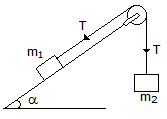Discussion
Home ‣ Mechanical Engineering ‣ Steam Nozzles and Turbines See What Others Are Saying!
- Question
The velocity of steam, in reaction turbines, is increased in the fixed blades as well as in moving blades.
Options- A. True
- B. False
- Correct Answer
- True
- 1. An ideal machine is one whose efficiency is
Options- A. between 60 and 70 %
- B. between 70 and 80%
- C. between 80 and 90%
- D. 100% Discuss
- 2. A push broach as compared to pull broach
Options- A. has less number of teeth
- B. is short and stocky
- C. removes less material for each pass of the tool
- D. all of the above Discuss
- 3. The defect which takes place due to imperfect packing of atoms during crystallisation is known as
Options- A. line defect
- B. surface defect
- C. point defect
- D. none of these Discuss
- 4. Which of the following would lead to a reduction in thermal resistance?
Options- A. In conduction, reduction in the thickness of the material and an increase in thermal conductivity.
- B. In convection, stirring of the fluid and cleaning the heating surface.
- C. In radiation, increasing the temperature and reducing the emissivity.
- D. all of the above Discuss
- 5. R-12 is generally preferred over R-22 in deep freezers since
Options- A. it has low operating pressures
- B. it gives higher coefficient of performance
- C. it is miscible with oil over large range of temperatures
- D. all of the above Discuss
- 6. Which of the following statement is correct?
Options- A. The human body can lose heat even if its temperature is less than the atmospheric temperature.
- B. The increase in air movement increases the evaporation from the human body.
- C. The warm air increases the rate of radiation of heat from the human body.
- D. both (a) and (b) Discuss
- 7. According to Euler's column theory, the crippling load for a column of length (l) with one end fixed and the other end hinged, is
Options- A.

- B.

- C.

- D.
 Discuss
Discuss
- 8. A block of mass m1, placed on an inclined smooth plane is connected by a light string passing over a smooth pulley to mass m2, which moves vertically downwards as shown in the below figure. The tension in the string is

Options- A. m1/m2
- B. m1.g sin ?
- C. m1.m2/m1+m2
- D.
 Discuss
Discuss
- 9. Reynolds number is the ratio of
Options- A. energy transferred by convection to that by conduction
- B. kinematic viscosity to thermal diffusivity
- C. inertia force to viscous force
- D. none of the above Discuss
- 10. The maximum efficiency of a lifting machine is
Options- A. 1/m
- B. V.R./m
- C. m/V.R.
- D. 1/(m x V.R.) Discuss
More questions
Correct Answer: 100%
Correct Answer: all of the above
Correct Answer: point defect
Correct Answer: all of the above
Correct Answer: it is miscible with oil over large range of temperatures
Correct Answer: both (a) and (b)
Correct Answer:

Correct Answer:

Correct Answer: inertia force to viscous force
Correct Answer: 1/(m x V.R.)
Comments
There are no comments.More in Mechanical Engineering:
Programming
Copyright ©CuriousTab. All rights reserved.
